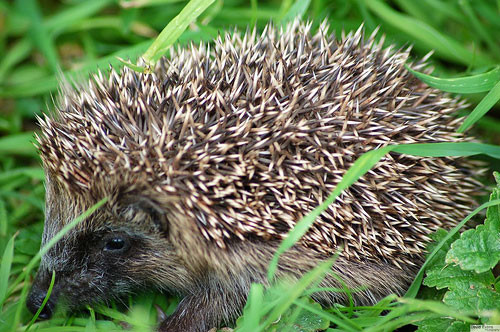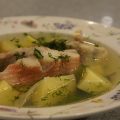 English cuisineThe most ancient dish, information aboutwhich have reached us, was nettle pudding, NEWSru.com reports. Eight thousand years ago, Neolithic cooks mixed stinging leaves with barley flour, salt and water, then put the resulting mass in a fish tank to give it shape. If there was no nettle at hand, these gourmets were content with fried hedgehog, although they had to deal with its needles. Later recipes prescribe killing the hedgehog, skinning it, then seasoning it with herbs to taste and drying it. After that, the carcass was coated with clay or surrounded by grass and fried over an open fire. Seven thousand years ago, Neolithic cooks knew barley bread. Three thousand years later, they began to prepare a more refined smoked-stewed dish of pork, smoked fish, milk and cream. But it was the Romans who really added variety to the national cuisine, argues Ruth Fairchild of the University of Wales. They added sweet ingredients to savoury dishes and introduced the custom of reclining over a multi-course meal. Fish sauces - garum - and liquamen - which included the whole fish - blood and entrails - were the basis of a number of first-century AD dishes. To make mitulis, a Roman dish of mussels in onion sauce, the shellfish had to be cooked with liquamen, chopped leeks and a sweet wine sauce. Some of today's popular dishes have roots much further back than you might think. Eight thousand years ago, meat pudding was made by stuffing the meat (mainly offal and fat) into the intestines, making it a distant ancestor of the heart-damaging sausages and veal tripe and giblets (the national dish of Scotland). "Then the Romans came along and added strange spices to the mix," says Fairchild. "Raisin dishes were very popular during the Norman period. The Normans loved dried fruit. It was during this time that fruit pies, Welsh pancakes and so on appeared." Culinary arts had their own regional characteristics even in the times of the ancestors of the modern English. Leeks were eaten mainly in Wales from about 4000 BC, because they grew better than onions in the poor soil there. And if "garum" and "liquamen" were not to everyone's taste, but otherwise Fairchild. "They ate as much meat, greens, and berries as they could find, so their diet was more nutritious than ours," she said. "Because it took so long to boil water and grind flour, they did not have the problem of overeating and, as a result, obesity that plagues us."
English cuisineThe most ancient dish, information aboutwhich have reached us, was nettle pudding, NEWSru.com reports. Eight thousand years ago, Neolithic cooks mixed stinging leaves with barley flour, salt and water, then put the resulting mass in a fish tank to give it shape. If there was no nettle at hand, these gourmets were content with fried hedgehog, although they had to deal with its needles. Later recipes prescribe killing the hedgehog, skinning it, then seasoning it with herbs to taste and drying it. After that, the carcass was coated with clay or surrounded by grass and fried over an open fire. Seven thousand years ago, Neolithic cooks knew barley bread. Three thousand years later, they began to prepare a more refined smoked-stewed dish of pork, smoked fish, milk and cream. But it was the Romans who really added variety to the national cuisine, argues Ruth Fairchild of the University of Wales. They added sweet ingredients to savoury dishes and introduced the custom of reclining over a multi-course meal. Fish sauces - garum - and liquamen - which included the whole fish - blood and entrails - were the basis of a number of first-century AD dishes. To make mitulis, a Roman dish of mussels in onion sauce, the shellfish had to be cooked with liquamen, chopped leeks and a sweet wine sauce. Some of today's popular dishes have roots much further back than you might think. Eight thousand years ago, meat pudding was made by stuffing the meat (mainly offal and fat) into the intestines, making it a distant ancestor of the heart-damaging sausages and veal tripe and giblets (the national dish of Scotland). "Then the Romans came along and added strange spices to the mix," says Fairchild. "Raisin dishes were very popular during the Norman period. The Normans loved dried fruit. It was during this time that fruit pies, Welsh pancakes and so on appeared." Culinary arts had their own regional characteristics even in the times of the ancestors of the modern English. Leeks were eaten mainly in Wales from about 4000 BC, because they grew better than onions in the poor soil there. And if "garum" and "liquamen" were not to everyone's taste, but otherwise Fairchild. "They ate as much meat, greens, and berries as they could find, so their diet was more nutritious than ours," she said. "Because it took so long to boil water and grind flour, they did not have the problem of overeating and, as a result, obesity that plagues us."

Making Money with Desserts: Success Stories
Evgeniya Polischuk (Fedutinova) instagram:@evgeniyafedutinovavk.com/janeshomebaking– It all started with baking for family and friends. Gradually, I started posting photos of my baked goods on Instagram – and orders started coming in. I made my first custom-made cake on October 13, 2014, and a little earlier I started making macaroons and cupcakes. You could say that the business “found me”, I am very […]

Soups are cold recipes with photos
Cold cucumber soup with yogurt and lemonsorbet from the chef of the restaurant La Taverna Alexander Zhurkin Photo: Getty Images Ingredients: Plain yoghurt – 125 g Cucumber – 150 g Lemon/lime sorbet – 50 g Cocktail shrimp – 24 g Fresh ginger juice – 1 g Lime juice – 5 g Fresh orange juice – 5 g Parsley – 1 g Pink pepper – 1 g Watercress – […]

barbeque kebab
Pork tenderloin in glaze Photo:Dmitry Bayrak/dbstudioPreparation time: 20 minutes + marinating time.Calories: 454 kcal per serving.For 4 servings: 4 pork tenderloins (approximately 300 g each), 1 onion, 2 cloves of garlic, 1 tsp. lemon zest, 1 tsp. lemon juice, a pinch of ground cumin, coriander and turmeric, 1 tbsp. vegetable […]

Pierre Duacan: dietary recipes: Ducane diet
Beetroot soup Photo:Season’S, Luxury Hotels RepresentationYou will need:· Boiled beetroot – 60 g· Fresh cucumbers – 20 g· Red radish – 20 g· Green onions – 10 g· Egg – 1 pc.· Drinking mineral water – 200 g· Salt – 1 gPreparation:· Boil the egg and beetroot.· Grate the cucumbers, radish and part of the beetroot. Put everything […]





